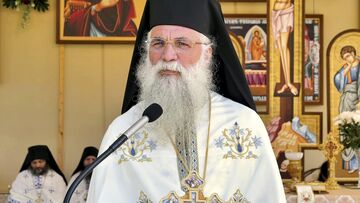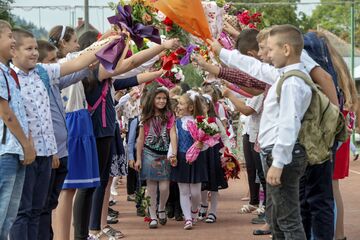Because school starts tomorrow, I read a prayer for the young people, pupils, students, and I came across a certain word on which I would like to focus for a bit. Not only for pupils and students, but also for you, parents and teachers, or spiritual parents. “Deliver them from every snare of the enemy.” We prayed to God to deliver the youth from the snares that imperil their souls and immediately after, we asked our all-good God to “raise them above petty worries.”
My thoughts went to the following aspect: How many of us realize the beleaguering small worries that overcome us and with which young people are especially burdened today?! Because I often meet high school or college students who do not have any set orderliness. No timetable when to awake, when to have their breakfast in the morning, no school schedule for study hours, for research hours, a set time when to retire; that is, to rest, to be in good shape for the next day. I have met students who stay up until midnight or even until the wee hours of the morning; I have met students who, regrettably, do not realize that being a student entails studying only. Indeed—it means only being a student. At the Student Congress on August 16, His Beatitude Patriarch Daniel and the President of the Romanian Academy, Mr Ioan Aurel Pop, drew attention to what students are supposed to do and what it means to be a student.
 As I have said in recent years, I will also reiterate today that a true student, a student who respects himself and the student name; who respects the faculty, the university where he studies; the professors; the specialty for which he prepares—such a young man has no time to waste! There is no free time for him; he will not busy himself—as we just prayed—with “petty worries.” He does not deal in trivialities. I have mentioned many times the five ugly plagues that befall today’s youth and not only them: drinking, smoking, gambling, pornography, and last but not least, a lack of attention to everyday life, drugs. So, a true student does not complicate his life with them. A young man who loves books and learning will ignore such little things because drugs, pornography, cigarettes, drinking, gambling are indeed little things. They do nothing else, dear young man and young woman, but destroy you. And you will not reach the age of maturity to be hopeful, trustworthy, able to hold a position in a teaching department, a leadership position somewhere, but above all, to be a good father or a good mother.
As I have said in recent years, I will also reiterate today that a true student, a student who respects himself and the student name; who respects the faculty, the university where he studies; the professors; the specialty for which he prepares—such a young man has no time to waste! There is no free time for him; he will not busy himself—as we just prayed—with “petty worries.” He does not deal in trivialities. I have mentioned many times the five ugly plagues that befall today’s youth and not only them: drinking, smoking, gambling, pornography, and last but not least, a lack of attention to everyday life, drugs. So, a true student does not complicate his life with them. A young man who loves books and learning will ignore such little things because drugs, pornography, cigarettes, drinking, gambling are indeed little things. They do nothing else, dear young man and young woman, but destroy you. And you will not reach the age of maturity to be hopeful, trustworthy, able to hold a position in a teaching department, a leadership position somewhere, but above all, to be a good father or a good mother.
That is why I’m calling your attention to these things today, at the onset of the school year. And I am hopeful the young people will remember. Because they have always been very close to Putna, and not just now, in these recent times, but continually. Young generations love Stephen because the holy and good ruler was categorical, dignified, authoritarian, and young people often like boldness and clarity. Well, His Majesty Stephen proved to be just so. That is why, as it is mentioned in a document, Mihai Eminescu opted 150 years ago that “we meet here, at His Majesty’s tomb, to promise that we had a past, and we want a future.” This was the will of the youth of 1871, and their ideal was carried over to the present day. And how beautiful were all those young students and pupils on August 14, 15, 16, 17 of this year—over 600 of them gathered at the tomb of the holy Voivode Stephen.
As one of the contemporary fathers of our Church said, “Keep your liveliness, keep your mind clear, keep this creative power, pierce and search with your mind the mysteries of wisdom, of the holy and good and pure teaching, and you will be nothing but joy to your parents.” I am convinced that all of us, at some point in time, maybe when we were little, we saddened our parents, who gave birth to us, who raised us. And whenever we did something wrong, there was no joy in their eyes. Well, a studious young man will fill his mother’s eyes with tears—not tears of grief, but of joy. And he will give his father that dignified gladness that he has a worthy child for whom he is not sorry to work hard to send him to school. This is what I wanted to say to our youth. But I also want to remind you that in the prayer said before, in a completely God-ordained way, we prayed the young people love something else. It is what Doxachi Hurmuzachi said in his testament—and because there are some people from Chernivtsi, Bukovina here, I will recount those words for you: “The Motherland, the Church, the nation and the language must never be betrayed!” And according to the prayer, “The Church, the Motherland, and the nation are the treasure of the soul.” The Church fathers who set this prayer for the beginning of the school year saw them as a treasure of the soul. We also entreated God to teach the young people “the joy of speaking the name of Christ and putting their hope in His help and blessing.”
Do not be afraid, dear young people, to call upon the name of the Lord, do not be ashamed to mark yourself with the sign of the Holy Cross, so that through it you may keep clarity of mind and purity of heart. For prayer is nothing but a source of cleansing, a source of upliftment, a spring that nourishes you and from which you will want to keep drinking. It is like living water flowing through our veins. This is the prayer to which we are called. And I say this not only for the young, but also for all of us who participated today in the Holy and Divine Liturgy, here at this monastery dedicated to the Dormition of the Mother of God.
 May our good God give us a guardian angel to wish our young people not to burden themselves with small things, to flee from everything that dishonors and degrades them. May they be able to look at themselves in the mirror and ask: “Is that how my father, my mother, and my holy ancestors want me to be?” And if they don’t like what they see, let them put aside the foibles of youth, the small things, and concern themselves with the lofty ones, because a young man really has no time to waste and truly no free time to squander! Amen!
May our good God give us a guardian angel to wish our young people not to burden themselves with small things, to flee from everything that dishonors and degrades them. May they be able to look at themselves in the mirror and ask: “Is that how my father, my mother, and my holy ancestors want me to be?” And if they don’t like what they see, let them put aside the foibles of youth, the small things, and concern themselves with the lofty ones, because a young man really has no time to waste and truly no free time to squander! Amen!
Archmandrite Melchisedec Velnic
